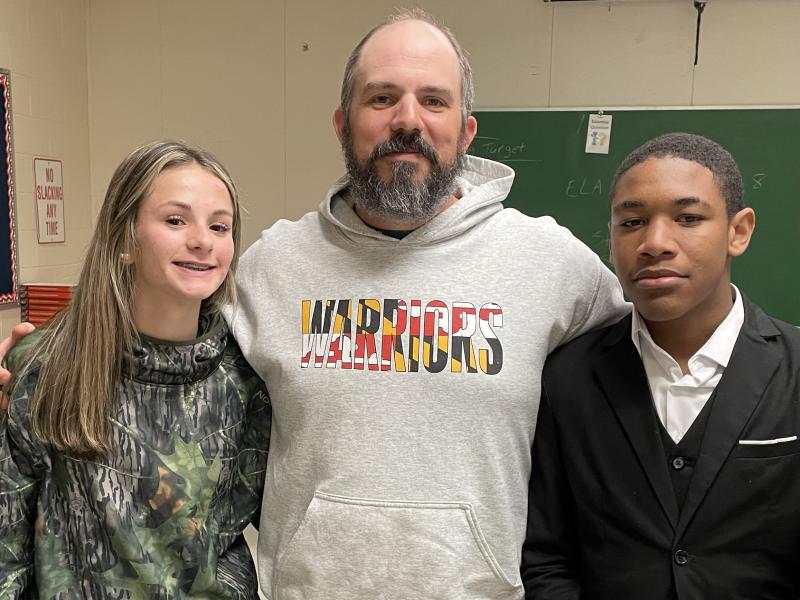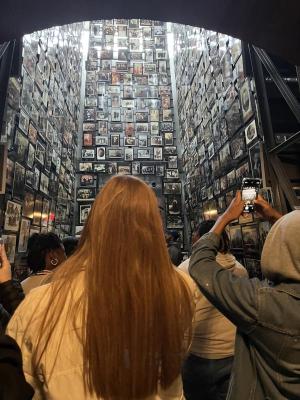While he grew up in a comfortable and loving home, Warren Rosenfeld knew the horrors of Nazi Germany had brought devastating heartache and death to his family.
“My dad came to America in 1939 at the age of 10,” he recalls on a Sunday morning at his Rehoboth Beach restaurant. “Every one of his relatives on both his father’s and mother’s sides were either survivors or victims of the Holocaust. But we grew up knowing that we should never hate someone because they’re different, and that our differences make the world go round.”
In 2023, after decades of success in business, law, and community service, he had the opportunity to bring that perspective to life for students at Snow Hill Middle School. It started when he received a letter asking for a contribution for a field trip to the United States Holocaust Memorial Museum. Two years later, his own efforts, coupled with tremendous community support, have enabled hundreds of students from Sussex Academy, Beacon Middle School and six other schools in Worcester and Wicomico counties to take that same trip.
It all happens with a mixture of enormous generosity and thoughtful dialogue when school representatives seek Warren’s funding to pay for the trips to the museum. He donates the bulk of the funds but also gives others the opportunity to contribute.
Yet every trip comes with an important condition: Rosenfeld visits the school, prior to departure, for a candid discussion with students, faculty and volunteers.
“I want to attach their experience with the museum to a real person who was affected, and tell the story about the Holocaust’s impact on my whole family,” he says. “In one case I ended up staying at the school for three hours. I’ve been surprised by how solemn the kids are ... and the questions I’ve gotten have been thoughtful. The lesson I’m trying to teach is that hate never ends well. It’s a miserable way to be.”
Showing and telling go hand in hand
Those thoughts are echoed by two students from Pocomoke Middle School who went to the museum on one of Rosenfeld’s recent trips.
As eighth grader Olivia Skorobatsch recalls, “We’d read ‘The Diary of Anne Frank’ so we knew about Hitler and his goals, but it was more meaningful because [Rosenfeld] came and told us about his relatives who didn’t survive and how his family got out of Europe and how harrowing the journey was. He also brought family pictures from right after they arrived in America, which put faces to the experience.”
She readily admits that parts of the Holocaust Museum were emotionally challenging.
“Seeing the artifacts ... the gas chamber doors, the shoes, especially the children’s shoes ... and the pictures of the victims all made it difficult to deal with. But they were details that we needed to experience. Some kids couldn’t handle the harsh videos, but it really does open your eyes even if it’s hard to watch.”
Fellow eighth-grader Tyrell Topping shares that sentiment.
“Being there at the museum was a whole different experience than you get from just reading about it in books or watching videos,” he says. “A better way to really understand it.”
He also reflects on how the experience enhances empathy for others in his daily life.
“Some kids at school get picked on for things they can’t help,” he says. “The Jewish people couldn’t control the way they were treated either. We don’t see it as much as when we were younger, but whenever we do, I try to get kids out of it.”
Social studies teacher Matthew Bolich, who coordinated the trip, notes that both Olivia and Tyrell are among his kindest students, and that they set good examples for others.
“I commend Tyrell because I’ve personally seen how he sticks up for other kids when they’re picked on – especially when he uses humor to defuse the tension,” he says.
Bolich also sees the trips as a fine way to expand educational horizons.
“You might expect kids on the Eastern Shore to have a small vision of the world, so this is a good opportunity for them to think bigger since D.C. has people from all over the planet. I want students to be aware that you can go anywhere in life if you work hard.”
An important future built on the lessons of the past
Back in Rehoboth, Rosenfeld’s commitment to the effort has greatly expanded. With additional support from friends and perhaps foundations, he wants to fund several more trips for students in Sussex, Wicomico and Worcester counties. Each trip costs several thousand dollars, based on transportation, lunch, and fees. And together they symbolize his enduring quest to tap life’s challenges and triumphs to pave the way for a more peaceful and enlightened world.
“I’ve made five-year commitments to all of the schools, with two conditions,” he says. “One is to let me know how the trip went and the other is to tell me, next year, what you need. I expect to fund this for the rest of my time on Earth.”
To learn more about the effort, email Warren at warren@rosenfeldsjewishdeli.com




















































